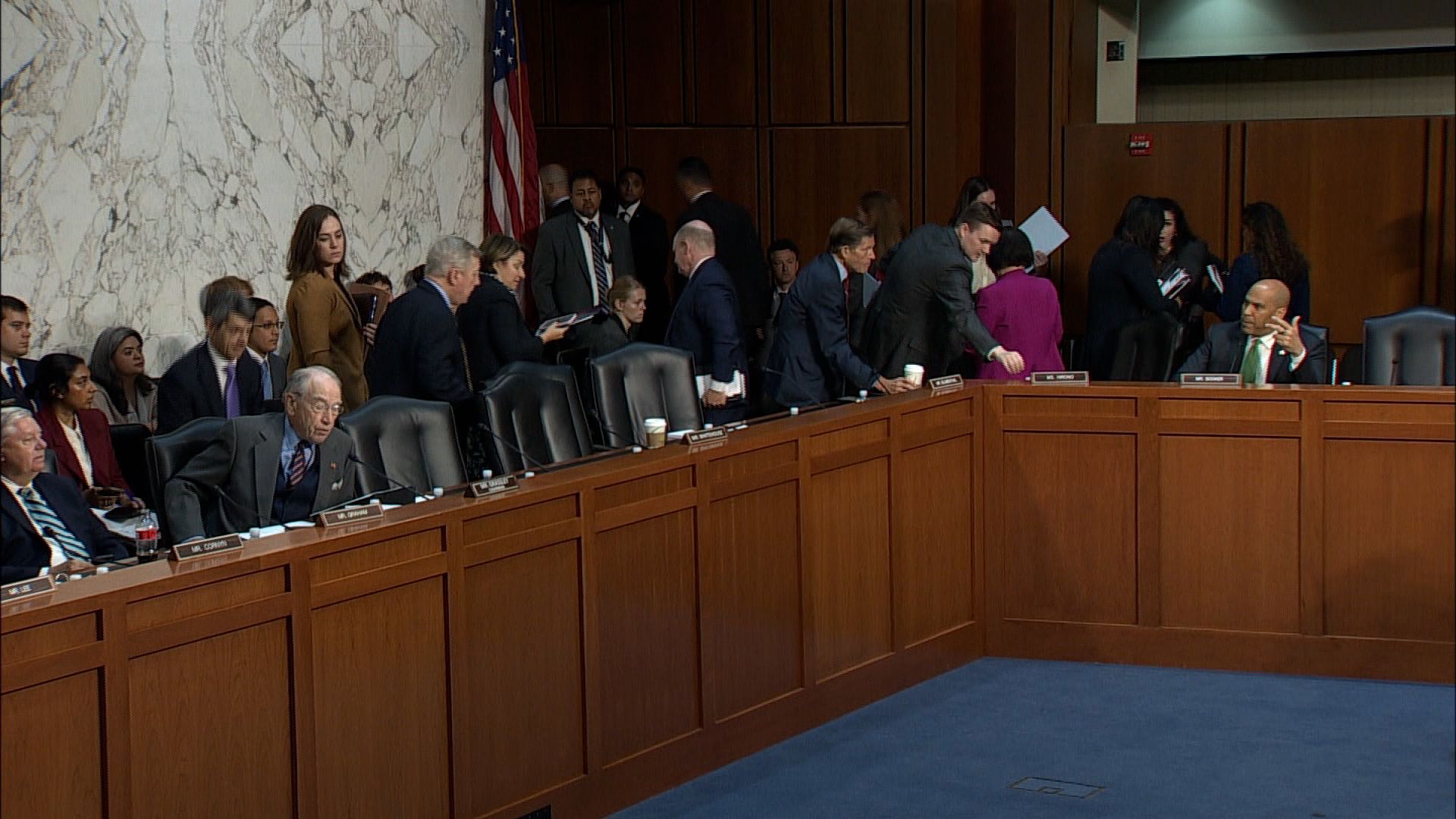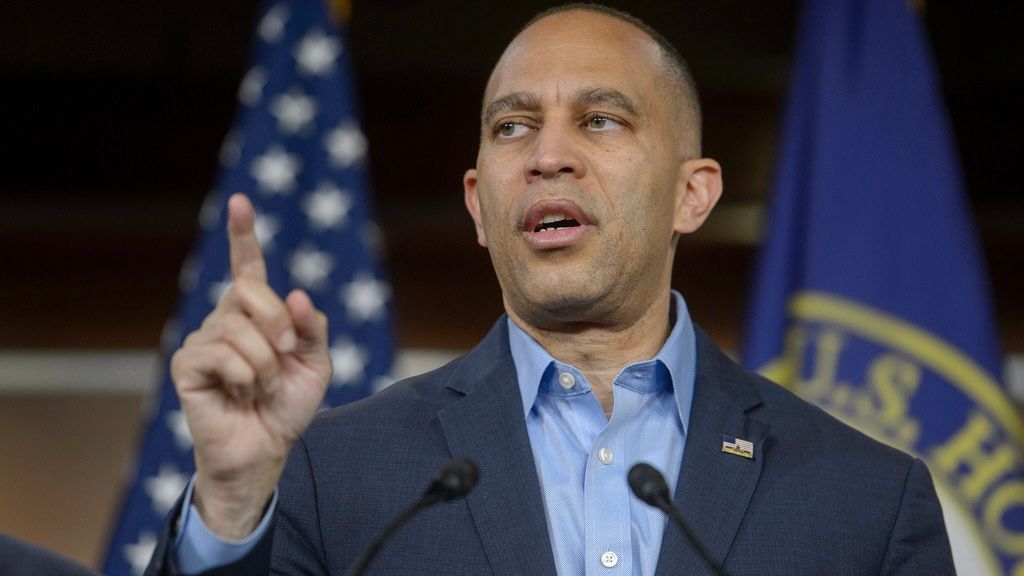
Chaos erupted in the Senate Judiciary Committee this week as a heated confirmation hearing for a Trump judicial nominee devolved into a shouting match, culminating in a dramatic walkout by Democratic senators.
At the center of the storm was Emil Bove, a controversial figure nominated by President Donald Trump to serve on the U.S. Court of Appeals for the Third Circuit, whose nomination has already drawn fierce opposition from Democrats and some moderate Republicans alike.
The turmoil began when Judiciary Committee Chairman Chuck Grassley (R-IA), the Senate’s eldest member at 91, denied a formal request from Senator Cory Booker (D-NJ) to delay proceedings in order to further investigate allegations raised by a former Justice Department whistleblower.
The whistleblower, Erez Reuveni, had previously accused Bove of misconduct during his tenure at the DOJ, allegations that Democrats argue are serious enough to merit additional scrutiny before any confirmation vote.
Booker, widely viewed as a potential Democratic contender for the 2028 presidential race, did not mince words when Grassley refused his procedural request.
Nearly shouting into his microphone, Booker launched a fiery diatribe against the Republican leadership’s handling of the hearing. “Why are you doing this? This is outrageous!” he exclaimed, his voice rising in frustration.
The tension in the room escalated rapidly as other Democratic lawmakers voiced their agreement. A female senator could be heard decrying the proceedings as a “Kangaroo court,” a term loaded with implications of a rigged and unjust process.
Booker pressed on, accusing Grassley of violating the Senate's own procedural rules. “This is wrong! You violate your own rules without going by… by the mandates of the parliamentarian,” Booker said, referencing the nonpartisan official responsible for interpreting Senate rules.

As Grassley attempted to call for a vote and regain control of the committee, Booker refused to be silenced. “This is unbelievable!” he shouted. “There’s a way to do this: If you want to force this through, if you want to ram this through, there’s a way to do it in accordance with the rules as spelled out by the parliamentarian.”
Behind the embattled senator, a procession of Democratic senators and their aides began filing out of the chamber, their collective exit a potent symbol of protest against what they described as a hijacking of the democratic process.
The Democratic exodus was triggered by Grassley’s rejection of Booker’s invocation of Rule 4, a procedural safeguard that allows committee members to delay a vote on a nominee to allow more time for deliberation.
“What are you afraid of?” Booker asked, his voice echoing across the chamber as the Democrats left. “Debating this nomination, putting things on the record — Dear God, that’s what we are here for.”
The New Jersey senator’s impassioned objections didn’t stop there. He challenged Grassley’s integrity directly, albeit respectfully, saying, “This lacks decency, this lacks decorum, it shows that you will not hear from your colleagues.
You are a decent man.” Booker then openly questioned whether the Trump administration was influencing Grassley’s behavior behind the scenes. “What are they saying to you that is making you do something to violate the decorum, the decency, and the respect of this committee to at least hear each other out?”
Despite the disorder and vocal opposition, Bove’s nomination cleared the committee in a party-line vote, with Republicans pushing the nomination forward. Yet the nomination is far from assured on the Senate floor.
Moderate Republicans, such as Senator Susan Collins of Maine, have signaled reservations about Bove’s suitability for a lifetime appointment to the federal bench. Collins, known for her willingness to break ranks with her party, especially on judicial nominations, is widely expected to vote against Bove when the matter comes before the full Senate.

Adding to the Democrats’ outrage, Senator Sheldon Whitehouse (D-RI) excoriated his Republican colleagues for ignoring the whistleblower allegations against Bove and for turning a blind eye to the growing concerns raised by DOJ insiders and legal professionals.
“There’s something rotten in Denmark,” Whitehouse declared, invoking the famous Shakespearean line to suggest deep-seated corruption within the process. Like Booker, Whitehouse also walked out of the hearing in protest, underscoring the gravity with which Democrats view the controversy.
Bove’s nomination itself is emblematic of Trump’s broader judicial strategy. The President has long railed against what he terms “activist judges” who have imposed nationwide injunctions blocking key initiatives of his administration.
Bove, seen as a staunch conservative and reliable ally in the judiciary, is part of Trump’s effort to reshape the federal courts with judges who are less inclined to interfere with executive power.
His nomination to the Third Circuit Court of Appeals — a critical appellate court with jurisdiction over Pennsylvania, New Jersey, Delaware, and the Virgin Islands — is viewed as strategically vital for the administration.
Yet Bove’s ascent is shadowed by his past at the DOJ and the allegations raised by Reuveni and other insiders. The whistleblower claims that Bove engaged in unethical behavior during his time overseeing sensitive cases, including manipulating prosecutorial decisions for political purposes — charges that, if proven, would seriously undermine his fitness for a judicial role.
Democrats have argued that ignoring such allegations sets a dangerous precedent, particularly for lifetime appointments that can shape American jurisprudence for decades.
Senator Richard Blumenthal (D-CT) did not mince words in his post-hearing comments to reporters. “I haven’t seen anything like it in 15 years in the U.S. Senate,” Blumenthal said. “Just overriding, roughshod, the rules of the committee to silence members on concerns involving the nominees for lifetime appointments on the federal bench.”

The controversy comes at a time of heightened political polarization in the Senate, where judicial nominations have increasingly become battlegrounds for ideological warfare.
Trump’s aggressive push to populate the judiciary with conservatives has drawn praise from the right but deepened divisions with Democrats, who argue that the integrity of the courts is being sacrificed for partisan gain.
Meanwhile, Bove’s nomination faces not only opposition from Democrats but skepticism from within the GOP itself. Beyond Collins, several fiscal conservatives and institutionalists within the party have expressed discomfort with the nominee’s background and the contentious confirmation process.
While the Judiciary Committee’s vote was a victory for the Trump administration, the final outcome in the full Senate remains uncertain.
Moreover, the episode has added fuel to the broader debate about Senate rules and decorum. Booker’s invocation of Rule 4 and his challenge to Grassley’s procedural rulings have raised questions about whether the current majority is respecting long-standing norms or simply bulldozing through objections to advance their agenda.
The Democrats' walkout, while dramatic, was also a desperate tactic to draw public attention to what they characterize as an abuse of power within the legislative process.
Political analysts suggest that the spectacle of senators storming out of a confirmation hearing could resonate with the Democratic base, particularly as the party gears up for the 2026 midterms and the looming 2028 presidential election.
Booker, by positioning himself as a leading voice of opposition, may have bolstered his standing among progressives who are increasingly frustrated with what they perceive as Republican overreach.
As the Senate prepares for a final vote on Bove’s nomination, the nation watches closely. The outcome will not only determine the future of one judicial seat but will also signal the balance of power in a deeply divided Senate.
For Democrats, the fight against Bove is about more than one man — it is a stand against a judicial strategy they fear will reshape America’s legal landscape for generations to come.




